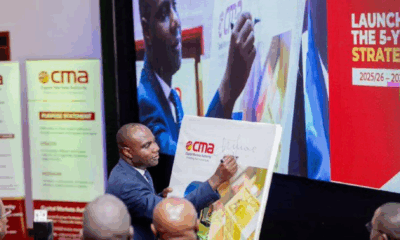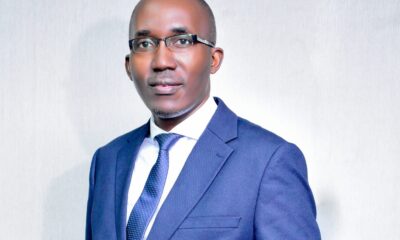Ramathan Ggoobi
NRM discuss politics as the economy continues to bleed!
When will NRM retreat at Kyankwanzi not to avert threats to Museveni’s presidency but to discuss the economic strategy of promoting inclusive growth in Uganda?
Earlier this month, rising by 57% compared to the corresponding month last year. With the exception of external interest payments and external development expenditure, all other expenditure aggregates were above the programmed levels.
Fiscal deficit (including grants) of Shs 614.5 billion was recorded compared to a programmed deficit of Shs 198.9 billion. This was mainly due to higher than programmed expenditures as well as lower than programmed revenues during the month.
Coffee exports amounted to 223,401, 60-kg bags, worth US$ 28.8million, representing a decline by 1.7% and 16.7% in volume and value, respectively, as compared to November 2011.
In the foreign exchange market, the Shilling was faced with depreciation pressures resulting in 1.7% loss in value against the US dollar during the month. The average inter-bank mid-rate was recorded at Shs. 2,662/US$ as compared to US$ 2,579/$ the previous month.”
Mr President, this is how the Macro Economic Policy Department at the MoFPED summarised and communicated the state of our economy last November. If I were the minister of finance or somebody of authority over Ministry of Finance, I would have sacked whoever prepared and disseminated this report.
Where’s rosy scenario?
Economist Robert Lucas won the Nobel Prize in Economics for letting us know how people’s expectations about the future have major effects on decision making in the present. He told us that people’s expectations primarily depend on the policies followed by government, but most importantly on the way government communicates those policies.
Americans invented the term ‘rosy scenario’ to communicate ‘an optimistic mood’ of the economy even in the midst of economic downturn. It started with Mr. Greenspan’s era who never allowed his officials at the Fed to publish an entirely pessimistic economic outlook without providing a positive and optimistic upshot.
By rolling out economic reports containing only bad news, officials at Ministry of Finance and Bank of Uganda do a great job at worsening the already not so good economic situation. And it is their habit to do so!
Rosy scenario does not call for telling lies about the economic situation. No. It simply calls for providing an optimistic view of a bad economic situation. It’s like when pathologists are required to provide sanguinity to patients by either not telling them what exactly the disease they suffer from is or by underplaying its gravity. It’s a commonly agreeable premise that psychology kills quicker than malady!
In Uganda we always get bad news, bad news, and bad news; from January to December! Granted, it a common practice in every country for media, economic commentators and politicians to love to portray a gloomy picture of the performance of the economy. Quite often this is expected of opposition politicians, media, and “independent” economists. But not from professionals working for and earning from government.
Casino economics
The talk in town right now is centred on the massive corruption and theft of government funds, and how it may have affected the ability of government to deliver services to the people of Uganda. Everyone, including government officials themselves, now feels it is corruption that primarily is contributing to economic stagnation and the worsening economic situation in Uganda.
My view is different. I feel that economic miscommunication could be affecting Uganda’s economy more does the rampant corruption! Who can invest in an economy portrayed by the indicators given in the government’s official report above? Who would want to save money and invest in capital goods in an economy whose present and future performance looks so bleak? Which Ugandan would want to keep his money in a bank in an economy whose currency value is depreciating at 1.7% per month? Not me, not any other risk-averse person, and not anyone else who does not fancy gambling.
Mr President, a few months ago I wrote in these pages a piece entitled, “Who’s really responsible for our economic woes?” In this article I let you know how Uganda was undergoing a battle between the ‘monetarists’ at Bank of Uganda and the ‘Keynesians’ at Ministry of finance that was threatening to create two economies, one run by the BOU and the other by government. Now they have reached the point where they don’t even think through the implications of their communications.
For some time now, I have also been warning your government, Mr President, about the dangers of practicing “casino economics” — the tendency to entrust the health of our economy to public transfers, especially ODA (official development assistance) in form of budget support, project aid and NGO transfers from industrialised countries. I anticipated that these countries were likely to run bankrupt, following the financial crisis of 2007/08, and as a result look for excuses to cut support to foreign countries. Such excuse came with the OPM corruption scandal.
‘Wishful economy’
We need to realise that it’s not about time for the global economy to fully recover. The IMF global economic outlook shows that industrialised countries are likely to remain broke for the foreseeable future. This means less and less foreign direct investments (FDI) will be available. It is only those economies that promise the highest returns on investment that will attract these minimal FDIs. A poorly performing global economy also means that remittances from Ugandans living and working abroad will continue to decline. So we are likely to see our foreign exchange earnings continue to dwindle, yet since our imports grow by the day (thanks to our poor trade policy and consumerism) the demand for forex will continue to grow.
What do these realities call for? They call for our realisation that only investment in the real sector that employs us — agriculture (right from production, processing, and marketing) — will help to increase productivity and output of tradable goods that would fetch the dollar for us. Mr President, stop gambling by making all public investments in ‘wishful economy’ in pursuance of overnight economic transformation.
You have drawn resources away from agriculture and as a result encouraged people to follow them up where they are — the so-called service sector (bars, phone kiosks, boda-boda, and vending of Chinese counterfeits). Now we are running an economy highly demanding but incapable of producing and earning foreign exchange. This trend must be stopped and I know you can stop it if you were as determined as you usually are when it comes to dealing with those who threaten your hold onto power.
We envisage a day when you will summon an NRM retreat at Kyankwanzi not to avert threats to your presidency but to discuss the economic strategy of promoting inclusive growth in Uganda. I usually detect dishonesty in you when you lament how some of your colleagues and opposition politicians have been sabotaging the economy. How come they only succeed at this but they never succeed at sabotaging your continued stay in power! Whenever you feel threatened by the Sekikubos (the so-called bad boys of NRM) you call for a retreat to deal with them. Why don’t you do the same to deal with the corrupt officials, the declining agricultural output, the depreciating shilling, and other biting economic issues?
Comments
Ramathan Ggoobi is Policy Analyst, and Researcher. He lecturers economics at Makerere University Business School (MUBS) and has co-authored several studies on Uganda's economy. For the past ten years, he has published a weekly column 'Are You Listening Mr. President' in The Sunrise Newspaper, Uganda's Leading Weekly


























